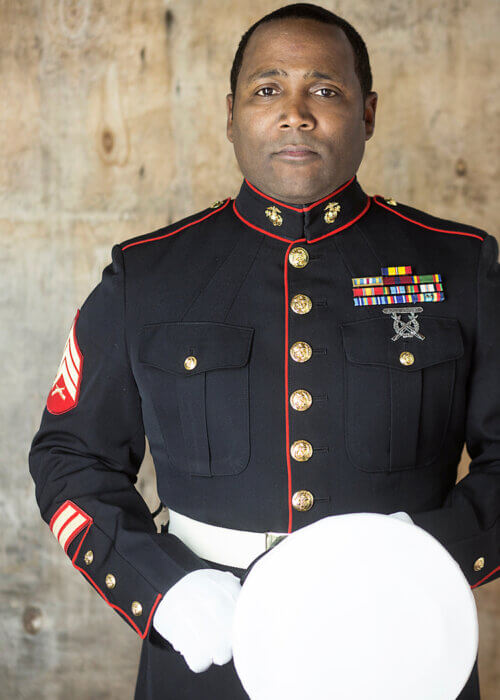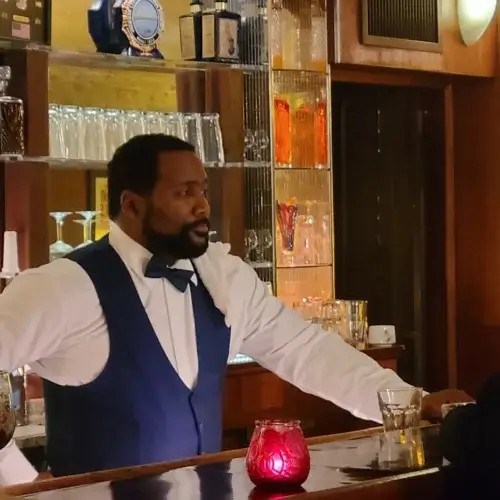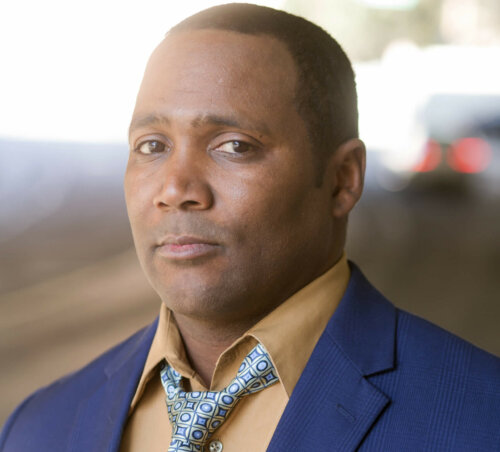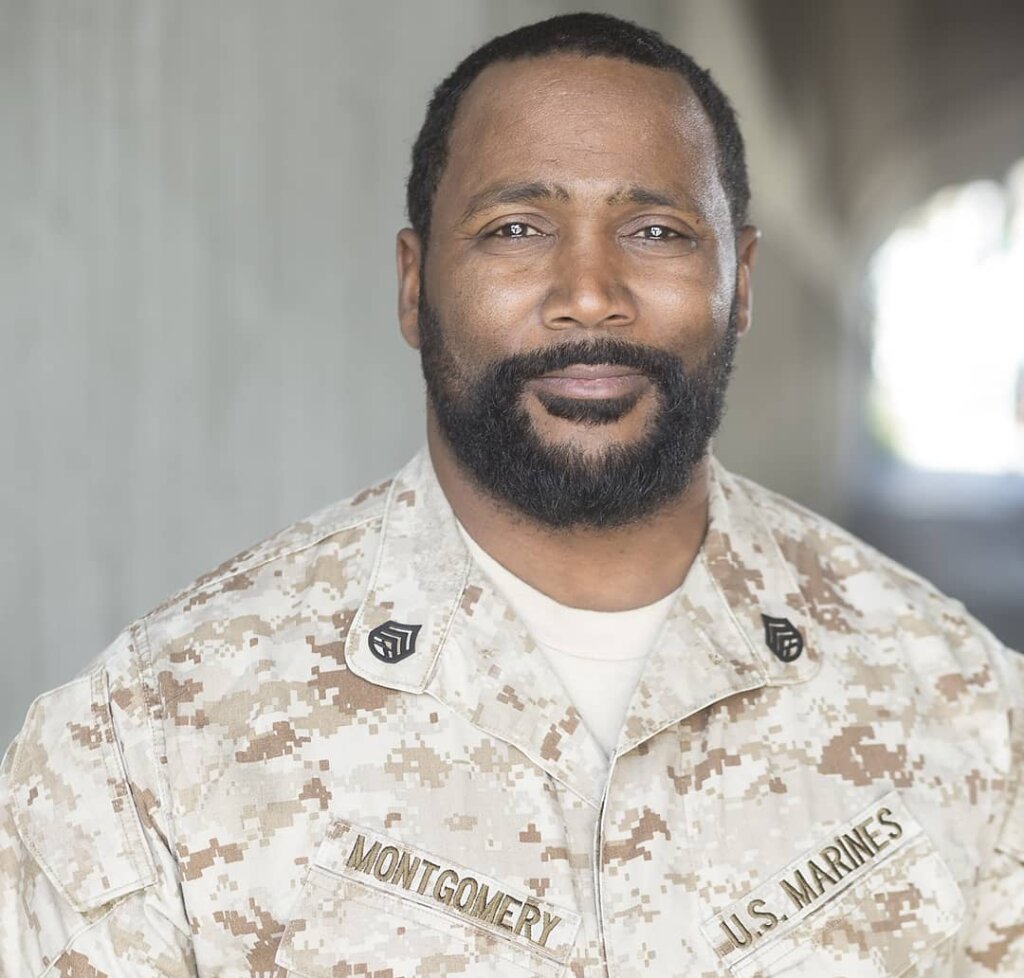Success Story: Marine Corps Veteran Darius Cottrell on Booking a POWERADE Commercial with Simone Biles
Darius Cottrell wears many hats. He’s a family man, producer, writer, teacher and a talented actor. He’s also a longtime Casting Networks member, booking a plethora of commercials and film roles over the years.
The actor took time out of his day to share insights and stories about how his time in the Marines prepared him for the entertainment industry and how it helped him land a gig in a high-profile POWERADE commercial alongside elite gymnast Simone Biles.
How did you decide to become an actor?
That’s a story of a story. [When I was] around 10 years old, I was just thinking to myself. You look at things you want to do as a child when you grow up. You say, “I want to be a doctor. I want to be a policeman, a fireman.” I wanted to be everything. So I looked at the TV. I was like, “Well, they are everything, so I want to be an actor. ”
It was just something that I think was always innate in me, and I feel that, like in a book I’m reading right now by Scott Sedita, it’s a calling. Everything you do in life is a calling. I think it was just my calling.
How did your time in the Marine Corps prepare you for the acting world? What were some takeaways from that experience that you now use in your everyday life?
I know the Marine Corps has been an intricate part of being an actor because, well, for starters, when I first got into the business, I used to do tech advising and special abilities for film and TV shows and commercials with a tech advising agency. That kind of opened the door for me because, at that moment, it helped me stay grounded. As a Marine, it’s always a hurry up and wait. As you know, being on-set is a hurry up and wait.
The Marine Corps prepared me in several ways. It prepared me mentally. It prepared me physically because I was doing a lot of physical stuff when I was doing that. It also prepared me to understand that you have to have a drive and you have to always remember that it’s important to be early. I find that funny because I go to auditions when we have in-person auditions or I have to submit a self tape, I always get it in early. I don’t wait until the last minute. As soon as I get it, I start working on the project or the dialogue. I start working on what I have to do.
I think if I didn’t have that fundamental of the Marine Corps, I probably wouldn’t be that person. I always arrive early because one of the Marine Corps mottos is if you’re on time, you’re late. If it says 12:00 and I get there at 12:00, I’m late.
There was an acting coach I [studied with] for commercials called Carolyne Barry before she passed. She was a drill instructor. A lot of people who had taken her classes didn’t like her because she was a drill instructor-type persona.
They turned to me and said, “Darius, you okay with her? How do you handle that?” I said, “That’s just the Marine Corps. She tells it as it is. She’s truthful. She’s straightforward, and she don’t take no BS.” That’s how the Marine Corps is, always being straightforward. It prepared me in many ways I didn’t know that it was preparing me.
Understand [that] you come across a lot of people who are going to be much harsher than your coach. I worked for a director one time and all he did was yell, yell, yell. Then the first AD said, “That’s his norm.” I said, “Oh, well, since I know it’s his norm, I’m fine.” I wasn’t taking it personally.
 Photo courtesy of Darius Cottrell.
Photo courtesy of Darius Cottrell.What was the POWERADE spot with Simone Biles like? What was that process?
On January 16, I got a request for a self tape. Now I have office space, but at the time, I had to set up my equipment and break it down at the house. I asked my youngest son to help me tape it. It said, “It’s a coach, and you have to do ballet moves.” I went and looked it up because you do your research. I said, “What ballet moves can I do?” Because I’m not a ballet dancer.
They weren’t looking for professionals. They’re just looking for you to have that persona. When I looked up the information, I said, “Okay. All right. I could do this.” I started looking at the dialogue. One of the dialogues was, “Soar, Turner. Soar.” You start off with just some basic dialogue of, “Come on. You could do this,” encouraging them, and then say, “Wait, pause.”
And then I pushed the music. And then I started dancing and telling them, “Let’s go. Let’s go. Come on. You can soar, soar, soar.” The audition tape…it was so much fun to do. My son was rolling and laughing as I was doing it.
The callback was interesting, though. It was on January 24, 2022. It was still on Zoom. It wasn’t in person. The director was there, and the clients and the casting director. The director said, “Okay, Darius, let’s go when you’re ready.” I did the same thing I did for my audition tape because when they see your audition tape, that’s what they like if they’ve got you for the callback. He goes, “Darius, I want you to give them more oomph.” I said, “You want me to be like a drill instructor?” He said, “Yes.”
I don’t know if he saw my Marine Corps background, but I said, “That’s all you had to tell me.” So I started barking at them like a drill instructor. Then we went to the dance, and I just went into it because, with any audition, you just got to go for it. So I just went for it. When I was done, he was like, “Yes, yes. That’s it. That’s it.”
He literally said these words, “Does anybody need to see anybody else? Does anybody need to see anything else from Darius?” And I went, “Did he just tell me I got the job?” Then my agent emailed me and told me they put me on avail. A couple of days later, I believe, I got the call that I was booked.
What was it like on-set?
We filmed at Azusa Pacific, their football field. It was an evening call. Of course, I had to be in the rain.
When they put the rain machine on, oh, gosh, we were there practically all night. I was soaked. My socks were soaked. My shoes were soaked, but they always brought me a new pair of socks. In between takes, the PAs would take my shoes off for me and give me some foot warmers. I said, “Y’all don’t have to do all that.” They said, “No, Darius. We got to make sure you’re good because you’re the main talent. We got to make sure you’re good.” I’m like, “I’m not the main talent. Simone Biles is the main talent. I’m just a talent.” It was a fun time, and I really enjoyed it.
Sometimes when you’re performing on-set, or even doing voice-overs, you second-guess yourself. You think, “Am I doing it right? Do they really like what I’m doing?” They wanted me back for the next day. Originally, it was supposed to be a one-day call, but they asked me to come back the next day to shoot another scene.
The second day was the scene where it was a press conference. It was Simone Biles, myself, one of the football players…it was just the three of us, but they had a row of athletes.
During the process, the clients came up to me and said, “Darius, can you do a voice-over for social media?” As we were shooting it, they were like, “Wow, Darius, everybody loves you. You’re doing a great job.” You’re like, “Are you really saying that because I’m doing a great job? Or are you saying that because I’m the actor, you’ll keep me comfortable?” Everything I did made the cut. So they loved what I did, and I enjoyed it.
Is Simone cool?
Oh, yeah. She was amazing. I’ve been in the business a while, so I know one thing when it comes to talking to somebody with a celebrity status, you don’t talk about anything personal that’s happened to them in their life that might be something that’s hurting them. She had her issues at the Olympics. I realized that you just talk to them. You don’t try to, “Oh, it’s you.” You don’t do all that.
How’d you first discover Casting Networks?
I was at an audition, and they were asking us to sign up for it. The casting director was telling us to sign up for it because they said they were going to start using that more. I actually got my commercial agent through Casting Networks…back in 2007.
When I coach my students, I tell them to open themselves up for representation on Casting Networks. That’s the first one I pitched because, with the others, you don’t have that privilege to seek representation. So, I told them, “Go to Casting Networks. Sign up there first.” Two out of the three students that I coach right now got representation through Casting Networks.
I’ve actually got more than one success story because I got my first agent through Casting Networks. I got my current agency, FTA, through Casting Networks because I just opened up myself for representation again because I was looking to change my team. I got new management through them and, through that, they got me with my new commercial agency.
I would recommend Casting Networks because if you tailor your portfolio or your profile—not just for getting jobs or getting auditions—you will get looked at.
Like I said, I set up three of my students, and two out of the three have gotten agents already. The third one, she hasn’t because when she finally got her profile up and running, the strike was happening. She’s very talented, so I’m sure, come January, she’s going to have an agent, too.
 Photo courtesy of Darius Cottrell.
Photo courtesy of Darius Cottrell.What else would you say helps someone succeed on Casting Networks?
Make sure your profile is done correctly because there’s some people on there, and they just have some pictures up. They don’t really have anything on their profile, and they wonder why they’re not getting any auditions.
Like I tell my students, you got to put in the work, and you’ve got to continue to constantly check your email because you don’t know. Something might fall through the cracks. Something might go in spam just for some random reason.
You have to also make sure that you’re training. You’re constantly training because when you look at someone’s profile, and my manager had to remind me of this, they want to see who you’re training with now. Once they see that you’re constantly training, you could be someone with no credits. But [when] they look at your headshot, they love your headshot. They look at your demo reel, and they say, “Wow, this person can act.” And then, all of a sudden, they look at your training. They say, “Okay, they’re training right now. Let’s call them in.” That gets you in the door.
Speaking of doors, what are some of the other high-profile jobs that you’ve booked on the platform?
I would say the top three would be the independent film I did that hasn’t been released yet. I loved working on-set with the director. It’s a full feature. POWERADE, of course, because I mean I didn’t see that coming. I would say, besides Jeep, there was one that was standing out as I was talking earlier— 23andMe.
The only reason that one stands out is because it was in 2017 going into 2018. Things were slow for me. I started driving Uber, and I’m like, “Oh, gosh.” One night, I was like, “I can’t do this anymore, God. I can’t because these people are getting to me right now. They’re getting to me.”
So I remember doing that. I remember I was like, “I can’t take this anymore. I need something to change.” I got an audition for 23andMe. It was me and my family, my mother-in-law, my wife, my oldest son, my granddaughter. We all went to the audition. They loved us, but they called my son and myself back, and we went back to the job. This was back when it was in person.
On the way to the callback, I started messing with him just out of the blue and started singing “Shake It Off” by Taylor Swift. He’s like, “Daddy, stop. Daddy, stop. People are looking.” I was like, “Let them look. Let them look.” It was just that energy that we had going into the callback.
As we got in there, the director, the casting director and the client, they were talking to us. “Tell us something fun y’all have done.” We started laughing, and we were like, “Well, we just did something five minutes ago. We were in the car singing Taylor Swift.” We booked the job, and it was timely.
Even though I did the Jeep [ad] that was with Oprah Winfrey’s voiceover and that was a huge campaign, 23andMe and POWERADE stand out the most because how it happened was just like, you just knew you were going to book it. Both of those ran for two years.
 Photo courtesy of Darius Cottrell.
Photo courtesy of Darius Cottrell.What’s the best way to approach an audition, whether it be self tape or in person?
Man, each one…when I say each one: film, television and commercials have their own different entity as in how to approach. They have similarities, but I’m going to start with commercials first. When you get your size or your information, because sometimes you don’t get any dialogue, you just get action or you just need to show up and then they’ll tell you. With each one, this is prevalent in the sense that it works for each one. You have to be able to listen.
Listen to what the director’s saying in the callback. Listen to the casting director in the audition. Listen to your agent and, most of all, read all your information because you don’t want to go into any audition blindsiding yourself because you didn’t read all the information. So [when] you go into a commercial audition, you have to understand if it’s not a character like Flo, for example, from Progressive, they’re looking for you. They’re not looking for a persona. They’re looking for you.
Most of your commercials now, they want to use real people, so they’re looking for you. So be yourself. That also flows in with TV and film. When you go into an audition, be yourself. I tell my students [that] humility will get you further than anything—number one. But you have to have natural humility. You go in. You be humble. Remember that everyone is important, not just the casting director, not just the director, not just the client when it comes to commercials, not just the producers with TV and film, but even the people who are crossing in the background.
Background is important. Catering [is] important, craft services. Everyone you must treat with love and respect. So going into an audition with humility, I think, is the most important thing—number one— because that will get you further in the business than anything. But be prepared because, as an actor, you must come in prepared. That’s the main thing. If you come in, you don’t have anything prepared, they’re going to look at you like, “What’s going on?”
Another thing I tell people, also, when you go to an audition, remember this. You don’t go in with one choice. You go in with several choices—three minimum. If you go over three, you’ll be fine, but you shouldn’t have to. Come in with choices because when you go into your audition and they go, “Hey, how about you try this?” If you’re going in with one set way, it’s hard to change.
It’s not hard to take information that someone gave you and use it, and if they give you information and you don’t understand it, don’t be scared. Ask. “Can you explain that to me, please, because I don’t understand what’s going on?” People are so afraid of casting directors and producers and directors and the client when it comes to commercials that they don’t do the one thing—ask questions.
It’s okay to ask questions because they want you to book the job because their job is to find talent and then shoot a project. If they don’t find the talent, they don’t shoot the project. You think they’re going to be like, “Oh, no, this person, oh, why are they here? I want to go home. I’m so tired. I don’t feel like working today?” That’s not how they are.
Another thing – people can’t take things personally when it comes to auditions. It’s a business. That’s the first thing I learned when I started.
When you’re going to understand that it’s a business, you see things differently. I didn’t get cast [not] because they didn’t like me. I didn’t get cast because I didn’t fit what they were looking for. They just found who they wanted and kept moving on.
If you get an audition, that speaks a lot because you’re talking about thousands of people who submitted, and you got an audition. Now you go to the callback. You got a callback that’s out of hundreds of people who auditioned.
The audition is the appetizer. The callback is the main course. Working on-set is your dessert for you to enjoy. Of course, [there’s] the money part, but it’s not all about the money.
Casting directors use Casting Networks every day to discover people like you. Sign up or log in today to get one step closer to your next role.
Did you book a role through Casting Networks? Tell us about it for a chance to be featured in an upcoming article.
You may also like:
- 5 Tips for Self-Submitting When You Have an Agent
- Get to Know the Casting Director: Karen Ryan
- 5 Signs It’s Time to Retire a Monologue
Chris Butera is a voice actor specializing in commercial, eLearning and corporate narration reads. When he’s not helping clients achieve their goals, he's playing guitar and bass.




